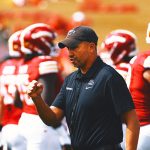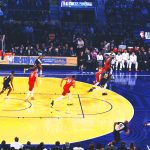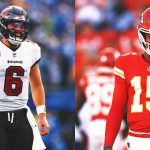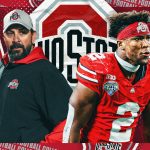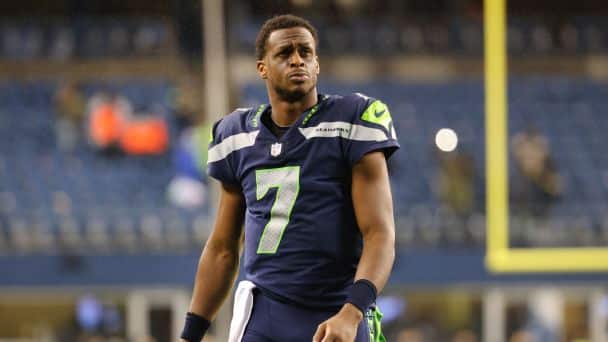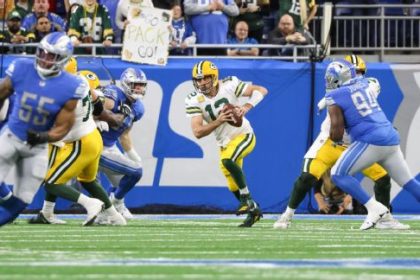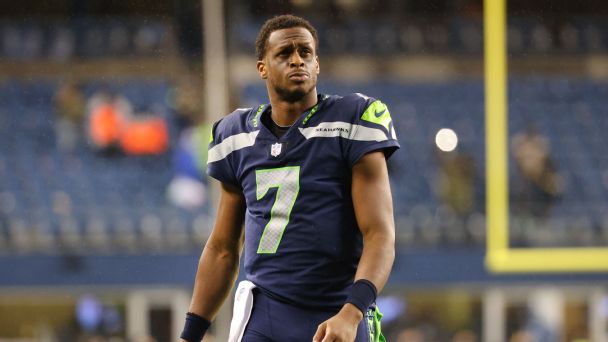
REX RYAN HAD just been fired as the New York Jets‘ head coach in December 2014 when he pulled Geno Smith aside for one final meeting.
The Jets had just stumbled to a 4-12 finish that cost Ryan and general manager John Idzik their jobs. Smith had thrown as many interceptions as touchdowns — 13 — over his 14 starts, a continuation of the turnover binge that marred his rookie season the year before.
Ryan would later realize he shouldn’t have thrown Smith into the starting lineup right away as a raw prospect from West Virginia. But Ryan was enamored with Smith’s talent, believing he’d be the Jets’ starter for at least the next decade.
Amid all the mistakes, there were flashes of that promise during his first two seasons. As a rookie, Smith had led the Jets to eight wins despite an overmatched roster that was favored in only five games. One victory came on the road over the Falcons, when a flawless Smith threw three touchdown passes before orchestrating the decisive field goal drive.
In the 2014 finale, Smith threw for 358 yards and three touchdowns in a road win over the Miami Dolphins — Ryan’s last game as the Jets’ coach and Smith’s last game as their full-time starter. Ryan calls it the best game he has ever seen a quarterback play.
Ryan was a believer, and on his way out of the Jets’ facility in 2014, he wanted Smith to know it.
“I remember the last thing I said to him,” Ryan recalled. “I go, ‘You’re going to be a hell of a quarterback in this league. Unfortunately, it’s not going to be for me.'”
As the Buffalo Bills‘ head coach in 2016, Ryan tried to trade EJ Manuel for Smith in a swap of onetime starters who had become relegated to backup roles. While the trade never came to fruition, Ryan’s parting words have come true eight years later.
But neither Ryan nor the Seattle Seahawks could have predicted it happening like this. Smith has gone from a backup for most of the past seven years and the presumed runner-up in Seattle’s preseason quarterback competition to a 2022 Pro Bowl selection who has positioned himself for a huge offseason payday. His stunning career turnaround will come full circle Sunday with the Seahawks (7-8) hosting the Jets (7-8) at Lumen Field.
Smith might be the only person who saw it all coming.
“Exactly as planned,” Smith said. “You can ask anybody. You can check my Instagram, my Twitter. I’ve been saying this for a while.”
A win over the Jets would keep the Seahawks in playoff contention, something that seemed like a pipe dream when they sent Russell Wilson to the Denver Broncos in a blockbuster offseason trade. While Wilson has floundered in Denver, Smith has flourished in Seattle.
“This guy’s a Pro Bowl player right now,” said Ryan, now an ESPN analyst. “And the perseverance to go through what he’s endured as backup for that many years and to finally get a chance to get back and be a starter again, it’s freakin’ unbelievable.
“I think it’s the best story in the league so far. I really do.”
BEFORE THE OFFSEASON program began, and as Smith battled Drew Lock in the Seahawks’ first quarterback competition since 2012, the same refrain echoed through the team’s personnel department:
“We know what Geno is.”
They viewed the 32-year-old Smith as a good backup and believed the 26-year-old Lock would be the starter. After all, the main reason the Seahawks wanted to trade Wilson to Denver was that Lock was the quarterback they wanted in return.
Smith, meanwhile, was the 10-year veteran who knew the offense and his receivers — having backed up Wilson the previous three seasons with three up-and-down fill-in starts last year — but hadn’t been a full-time starter since 2014. By this point, Smith had almost as many bad breaks as games started over the previous seven seasons while backing up three of the most durable quarterbacks in NFL history in Eli Manning, Philip Rivers and Wilson.
There was the infamous punch from Jets teammate IK Enemkpali in 2015 that broke Smith’s jaw, costing him his starting job. Then there was the ACL tear midway through the 2016 season in his return to the Jets’ starting lineup, thwarting what was supposed to be an extended look at Smith back in the role of QB1. Smith was poised to get that chance the following year with the New York Giants, who benched Manning late in the season in favor of Smith only to reverse course after one game and reinsert Manning as the starter.
“I can’t say it was tough because I’ve been so blessed,” Smith said earlier this month. “Honestly, my tough times would be a dream to someone else. I never will look at it as something that was too hard for me or really tough because throughout that time, I was still enjoying my life and still in the NFL.
“For the most part, it was just feeling like there was a glass ceiling and you want to break that ceiling. It’s like something hovering over you that you just want to break, so you can continue to grow further. For me, I just had to stay patient until I had the opportunity.”
Smith finally got that opportunity after the Wilson trade. Pete Carroll had put Smith in the lead position at the start of the offseason program and kept him there through training camp, citing the incumbent’s command of the offense as the reason he remained ahead — even as Lock seemed to outplay him in the team’s training camp scrimmage.
Lock continued to build momentum until he was sidelined by COVID-19 just as he was preparing to make his first start in Seattle’s second preseason game. After Lock threw three interceptions while playing the majority of the preseason finale, Carroll named Smith the starter.
“It finally worked in Geno’s favor,” Ryan said. “All the s— that happened to Geno with the broken jaw, all this other stuff, backing up really some legends of the game, he finally got his opportunity, it finally lined up his way for once, and now he’s taking advantage of it.”
When Smith tossed two touchdown passes to beat Wilson and the Broncos in Week 1, it marked the NFL’s longest gap between opening-day starts since 1971.
“I’m very set in who I am and know exactly what I can do,” Smith said earlier this season, after being named the NFC’s Offensive Player of the Month for October. “So I never bought into the narrative that’s been out there. I didn’t just get this good over the course of one offseason.”
BEFORE THERE WAS Geno Smith, there was Rich Gannon. And before Gannon made four straight Pro Bowls and won MVP in his mid-30s with the Raiders, he spent four seasons with the Kansas City Chiefs, mostly as a backup.
When former Chiefs coach Marty Schottenheimer approached Gannon on the sideline during his first minicamp practice with Kansas City in 1995, after he had thrown a tough-luck interception during an otherwise perfect 7-on-7 period, he gave the quarterback a stern warning, the kind Gannon had never heard in seven NFL seasons:
“If you don’t take care of the football, you won’t play here.”
Gannon, who called several of Smith’s games with the Jets as a color commentator for CBS, said he thinks Smith never heard that message early in his career, when he committed a combined 41 turnovers between 2013 and ’14, the third most in the NFL in that span.
“For me personally, I think it was just me pressing back then,” Smith said. “You just really understand that in the NFL, most games are actually lost than won.”
Last week, Smith became the first quarterback since Gannon in 1999 to be selected to his first Pro Bowl in Year 10 or later of his career.
“He sat behind Eli, Philip and Russell and didn’t complain,” said Seahawks linebacker Bruce Irvin, who was also Smith’s teammate at West Virginia. “As a competitor, that’s hard, especially when you feel like you can play. … For him to get his shot and live up to expectations is really cool to see. That’s what you want to see, a younger player grow into a really good player. He’s looking like the Geno from West Virginia. He’s confident, he’s commanding the huddle, making unbelievable throws.”
Even with five interceptions over his past five games, Smith has the league’s seventh-best TD-to-INT ratio at 27-9. Despite his recent dip in production, he ranks fifth in Total QBR at 63.3 — nearly 20 points higher than what he posted over his first nine seasons. And he’s still tops in completion percentage at 70.7%.
“I think he’s done a much better job of taking care of the ball,” Gannon said. “He’s not throwing into double coverage. He’s not throwing the ball late down the middle. He’s gotten better with ball security in the pocket.”
Save for a stretch in December in which he was too aggressive by his own admission, Smith has steadfastly taken what defenses have given him. And he has consistently been the league’s most accurate quarterback. He ranks first by a wide margin in completion percentage over expectation (a metric from NFL Next Gen Stats that takes into account the difficulty of each throw) and in adjusted completion percentage (which is similarly weighted by air yards and excludes drops and throwaways).
“He’s using all the tools in his toolbox,” Gannon said. “Early in his career, I don’t know that he even knew where the toolbox was.”
Manning sees a quarterback who’s in complete control at the line of scrimmage.
“And that was probably something he didn’t do a whole lot early in his career, or even in his time with the Giants,” Manning said. “Just changing protections a lot, doing it quickly, getting up there, just knowing what he wants to do, what he’s looking for. If he does change it, he knows what his problems are. I’m just seeing very much a great understanding of everything going on and being able to not take hits, throw hots and sights and just being able to play fast and make adjustments and do it for the right reasons.”
Carroll knows his quarterback is the “real deal.” Still, the Seahawks have gotten a Pro Bowl season from Smith for the bargain contract of $3.5 million, plus whatever amount he earns of the additional $3.5 million he has available in incentives (he’d likely get $2.5 million if the Seahawks miss the playoffs and all $3.5 million if they qualify). The bill is about to come due, with Smith’s one-year deal set to expire in March.
Conventional wisdom says the two sides will get a deal done, but it might not be that simple. Would Smith sign a deal before free agency for anything that isn’t in line with the franchise tag, which is projected at $31.5 million? Would the Seahawks, who still believe in Lock, give Smith that kind of money without knowing that another team would offer him the same? How much value will Smith place on the chance to remain in a system that clearly suits him?
Only one thing is clear right now: Smith has played his way into a massive raise thanks to a resurgent season that perhaps no one else but him saw coming.
“What a thrilling story for the kid,” Carroll said. “He just hung in there so tough and outlasted it, and now he’s enjoying all the fun of it.”

